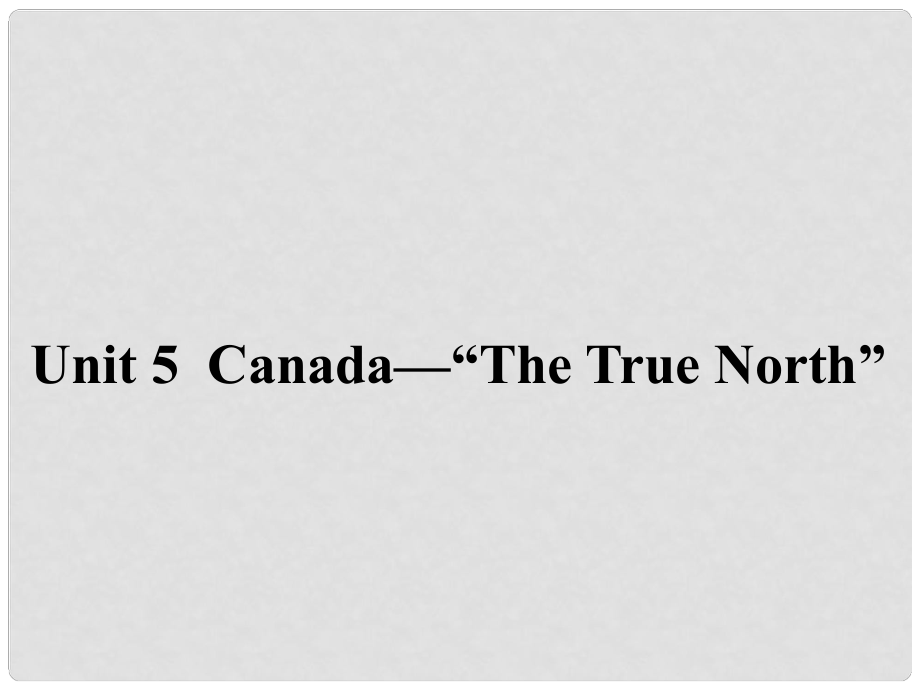《高中英語(yǔ) Unit 5 Canada“The True North”《Section Three》同課異構(gòu)課件1 新人教版必修3》由會(huì)員分享����,可在線閱讀���,更多相關(guān)《高中英語(yǔ) Unit 5 Canada“The True North”《Section Three》同課異構(gòu)課件1 新人教版必修3(20頁(yè)珍藏版)》請(qǐng)?jiān)谘b配圖網(wǎng)上搜索。
1��、Unit 5 Canada“The True North” LEARNING ABOUT LANGUAGEMeaning for multi- wordsmulticulturalmulticoloredmultinationalmultimediamultistorymultichannelincluding many culturesmade of many colorsincluding many nationsusing many mediahaving many storieshaving many channelsMore words formed using multi-mult
2�、iformmultitrackMultifaithMultimemberexisting in many formsmade of many tracksincluding many religions/faithsmade of many members/peopleMeaning for -wards wordseastward(s)forward(s)upward(s)outward(s)downward(s)backward(s)to the eastahead, to the frontto higher position/level out, in a direction away
3、to lower position/levelto the rear, to the backMeaning for -wards wordswestward(s)southward(s)northward(s)inward(s)toward(s)to the westto the southto the northto the insidein a direction toAnswer key for Exercise 2:1. baggage 2. minister3. quiz 4. chat5. aboard 6. scenery7. slightly 8. surroundAnswe
4�����、r key for Exercise 3: surrounds, border, measuring, within, harbour, urbanSAMPLE DIALOGUE FOR EXERCISE 4:LI DAIYU: What did you like best on the trip from Vancouver to Toronto?LIU QIAN: My favourite part was seeing the grizzly bear in the mountains.LI DAIYU: I loved the mountains wild scenery.LIU QI
5��、AN: What did you think of center where they grow all that wheat on the big farms?LI DAIYU: Actually, the Great Lakes we saw later were more beautiful.LIU QIAN: Me too. The busy port Thunder Bay was pretty interesting. I was surprised that the ships can come that far into the country. 同位語(yǔ)從句同位語(yǔ)從句 1. 同
6����、位語(yǔ)從句一般跟在某些名詞如同位語(yǔ)從句一般跟在某些名詞如idea, fact, news, hope, belief, suggestion, proposal, word, thought, doubt, truth, possibility, promise, order等的后面,用以說明或解釋等的后面���,用以說明或解釋該名詞的具體內(nèi)容�����。如該名詞的具體內(nèi)容���。如:We heard the news that our team had won. I have no idea where they are spending their holidays. 2. 同位語(yǔ)從句有時(shí)可以不緊跟在它所說同位語(yǔ)
7���、從句有時(shí)可以不緊跟在它所說明的名詞后面,而是被別的詞隔開�,明的名詞后面,而是被別的詞隔開�����,以使整個(gè)句子結(jié)構(gòu)顯得平衡����。如:以使整個(gè)句子結(jié)構(gòu)顯得平衡。如: He got the news from Mary that the meeting was put off. Word came that Hussein had been captured. 3. 同位語(yǔ)從句通常由同位語(yǔ)從句通常由that引導(dǎo)�����,但引導(dǎo)�,但that不在從句中充當(dāng)成分,也不能省略��;不在從句中充當(dāng)成分�����,也不能省略;同位語(yǔ)從句也可以由同位語(yǔ)從句也可以由whether, when, where, how等引導(dǎo)����。如:等引導(dǎo)���。如:They
8��、 raised the question where we should go. 4. 引導(dǎo)同位語(yǔ)從句表示引導(dǎo)同位語(yǔ)從句表示“是否是否”時(shí)��,只時(shí)��,只能用能用whether而不用而不用if�����。5. 同位語(yǔ)從句與定語(yǔ)從句的區(qū)別:同位語(yǔ)從句與定語(yǔ)從句的區(qū)別:從詞類上區(qū)別:同位語(yǔ)從句前面的名從詞類上區(qū)別:同位語(yǔ)從句前面的名詞只能是詞只能是idea, fact, news, hope, belief, suggestion等���;而定語(yǔ)從句的先行詞等;而定語(yǔ)從句的先行詞可以是名詞���、代詞�����,也可以是整個(gè)句可以是名詞��、代詞�,也可以是整個(gè)句子。子�。從性質(zhì)上區(qū)別:同位語(yǔ)從句是名詞從性質(zhì)上區(qū)別:同位語(yǔ)從句是名詞性從句,其
9���、作用相當(dāng)于一個(gè)名詞�,性從句��,其作用相當(dāng)于一個(gè)名詞��,是對(duì)前面的名詞作進(jìn)一步解釋����、說是對(duì)前面的名詞作進(jìn)一步解釋、說明���;定語(yǔ)從句的作用相當(dāng)于一個(gè)形明��;定語(yǔ)從句的作用相當(dāng)于一個(gè)形容詞��,用來修飾前面的名詞���、代詞容詞����,用來修飾前面的名詞����、代詞或句子����。或句子����。從引導(dǎo)詞及其在句中的成分上區(qū)別從引導(dǎo)詞及其在句中的成分上區(qū)別:有些引有些引導(dǎo)詞如導(dǎo)詞如how, whether等可以引導(dǎo)同位語(yǔ)從等可以引導(dǎo)同位語(yǔ)從句句, 但不能引導(dǎo)定語(yǔ)從句。定語(yǔ)從句的引導(dǎo)但不能引導(dǎo)定語(yǔ)從句���。定語(yǔ)從句的引導(dǎo)詞均在從句中充當(dāng)特定的句子成分����。如詞均在從句中充當(dāng)特定的句子成分���。如:I wont believe the fact that he
10�、 lied to his mother. (that引導(dǎo)同位語(yǔ)從句,對(duì)引導(dǎo)同位語(yǔ)從句��,對(duì)fact進(jìn)行進(jìn)行說明說明, that不充當(dāng)句子成分���。不充當(dāng)句子成分�����。)I wont believe the fact (that) he told me. (that引導(dǎo)定語(yǔ)從句引導(dǎo)定語(yǔ)從句, 對(duì)對(duì)fact進(jìn)行限定��,進(jìn)行限定�����,that在從句中充當(dāng)賓語(yǔ)��。在從句中充當(dāng)賓語(yǔ)�����。) 在空格處填上適當(dāng)?shù)脑~����,使下列定語(yǔ)從在空格處填上適當(dāng)?shù)脑~�����,使下列定語(yǔ)從句和同位語(yǔ)從句完整。句和同位語(yǔ)從句完整���。1. This is the mountain village _ I stayed last year.2. Ill never
11��、 forget the days _ I worked together with you.3. Please pass me the book _ cover is green. where whenwhose4. The news was very exciting _ our class had won the football match.5. They are familiar with the opinion _ all matter consists of atoms.6. The question _ we shall have a meeting hasnt been dec
12����、ided.7. They told the policeman the fact _ they had nothing to do with the murder.thatthatwhere / when / whetherthatFIND OUT THE APPOSITIVE CLAUSE FROM THE READING TEXT. The thought that they could cross the whole continent was exciting. Some people have the idea that you can cross Canada in less th
13��、an five days, but they forget the fact that Canada is 5,500 kilometers from coast to coast. The girls were surprised at the fact that ocean ships can sail up the Great Lakes.FINISH EXERCISE 2 ON PAGE 371. The possibility that the weather in winter would be warmer pleased the Canadians.2. The idea th
14���、at there will be an earthquake terrifies many people.3. The hope that we could go to France was exciting.4. The fact that more and more people settle down in Canada surprises me.5. The belief that the world is flat is not scientific.FINISH EXERCISE 3 ON PAGE 37They expressed the thought that they would come back soon. They simply could not stand the reality that their tunnels had been destroyed.The news that our women volleyball team had won the championship encouraged us all greatly. I have gotten the message that Tom had won the game.They expressed the wish that she would accept the award.
 高中英語(yǔ) Unit 5 Canada“The True North”《Section Three》同課異構(gòu)課件1 新人教版必修3
高中英語(yǔ) Unit 5 Canada“The True North”《Section Three》同課異構(gòu)課件1 新人教版必修3

